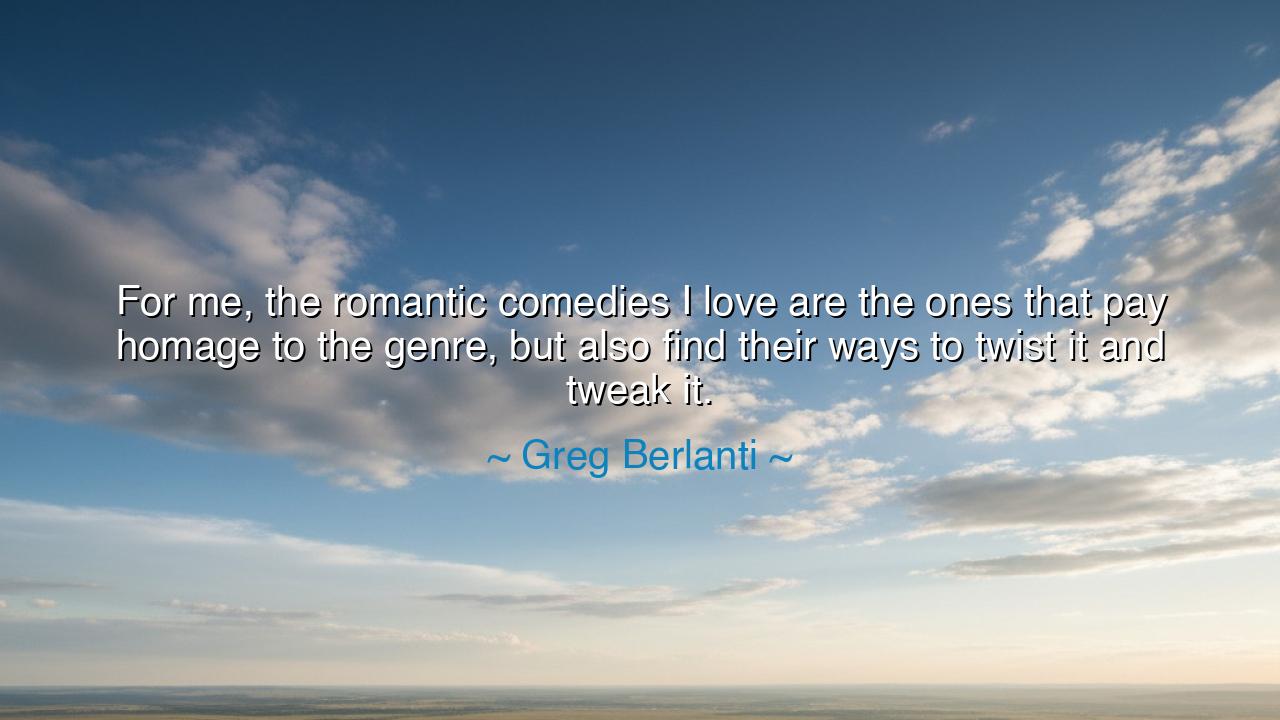
For me, the romantic comedies I love are the ones that pay homage
For me, the romantic comedies I love are the ones that pay homage to the genre, but also find their ways to twist it and tweak it.






The words of Greg Berlanti—“For me, the romantic comedies I love are the ones that pay homage to the genre, but also find their ways to twist it and tweak it”—speak to the delicate balance between reverence for tradition and the courage of innovation. In them, we hear the voice of one who recognizes that the romantic comedy is not a stagnant form, but a living vessel, meant to carry forward the spirit of love and laughter across generations. To “pay homage” is to honor the roots, the timeless patterns of affection, humor, and misunderstanding that have enchanted audiences for centuries. Yet to “twist and tweak” is to prevent stagnation, to allow the form to breathe with the realities and complexities of the present age.
The origin of this wisdom can be traced to the history of storytelling itself. Every art form, whether epic poetry, theater, or film, begins with tradition, with archetypes passed down from those who came before. The Greeks honored their gods with dramas, yet even Euripides dared to challenge the myths with new perspectives. Shakespeare drew upon ancient plots, yet filled them with fresh wit and vitality. So too with romantic comedies: the genre rests upon familiar rhythms—two hearts divided, laughter in confusion, a final union—yet it demands continual renewal if it is to stay alive in the hearts of its audience.
Consider the story of Jane Austen. Her works, such as Pride and Prejudice and Emma, paid homage to the long tradition of courtship tales, yet she twisted them with irony, social critique, and depth of character unseen in the works that came before her. She revered the form, yet she refused to let it remain stagnant. As a result, her novels endure as the very cornerstone of romantic storytelling. In her, we see Berlanti’s wisdom embodied: tradition honored, yet transformed.
What Berlanti reveals is that romance itself demands this balance. To love is to honor what is ancient and eternal—the longing for connection, the joy of union—but it is also to embrace change, to adapt to new lives, new challenges, and new realities. Just as no two romances in life are ever exactly the same, no two romantic comedies should be carbon copies. The genre must evolve, reflecting the shifting truths of the human heart and the world it inhabits.
The lesson, therefore, is that we must not cling blindly to tradition, nor discard it altogether. Instead, we must treat it as a foundation: strong enough to hold us, but flexible enough to be built upon. In art, this means creating stories that honor the past but speak to the present. In life, it means honoring the rituals of love—kindness, loyalty, laughter—while finding new ways to express them in our unique journeys. Homage without innovation grows stale; innovation without homage loses its roots. Only when both are present does the story truly thrive.
Practically, this lesson calls us to action: in your own life, do not fear to honor the past while making it your own. Cherish the traditions of your family, your culture, your relationships—but do not let them confine you. Twist them, adapt them, breathe your spirit into them, so that they remain alive. And when you encounter art, embrace both its echoes of the past and its whispers of the future.
Thus, Berlanti’s words are not only about film but about the rhythm of life itself. Every love, every creation, every story is part homage and part innovation. The wise know how to bow to what came before while daring to shape what comes next.
So let this truth be handed down: the greatest romances, on screen and in life, are those that honor the eternal while daring to surprise. To pay homage is to show gratitude; to twist and tweak is to keep love—and life—forever new.






AAdministratorAdministrator
Welcome, honored guests. Please leave a comment, we will respond soon